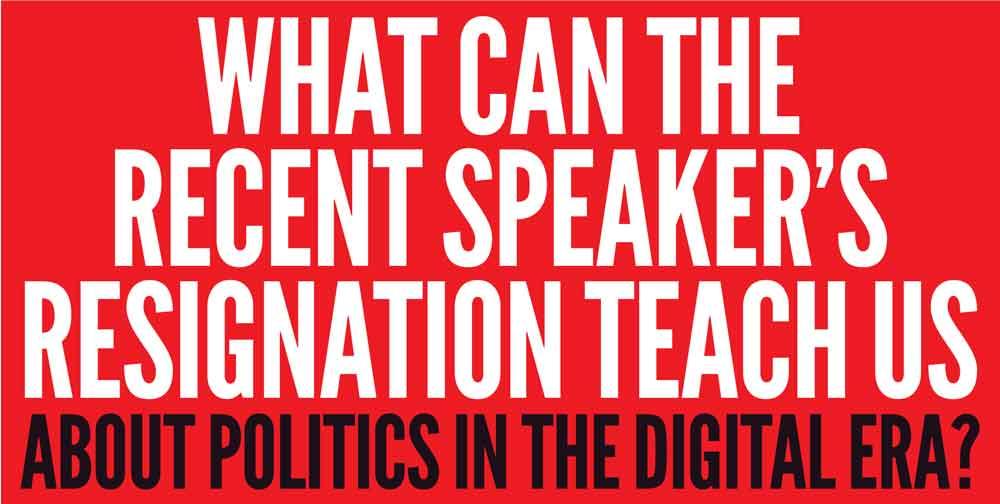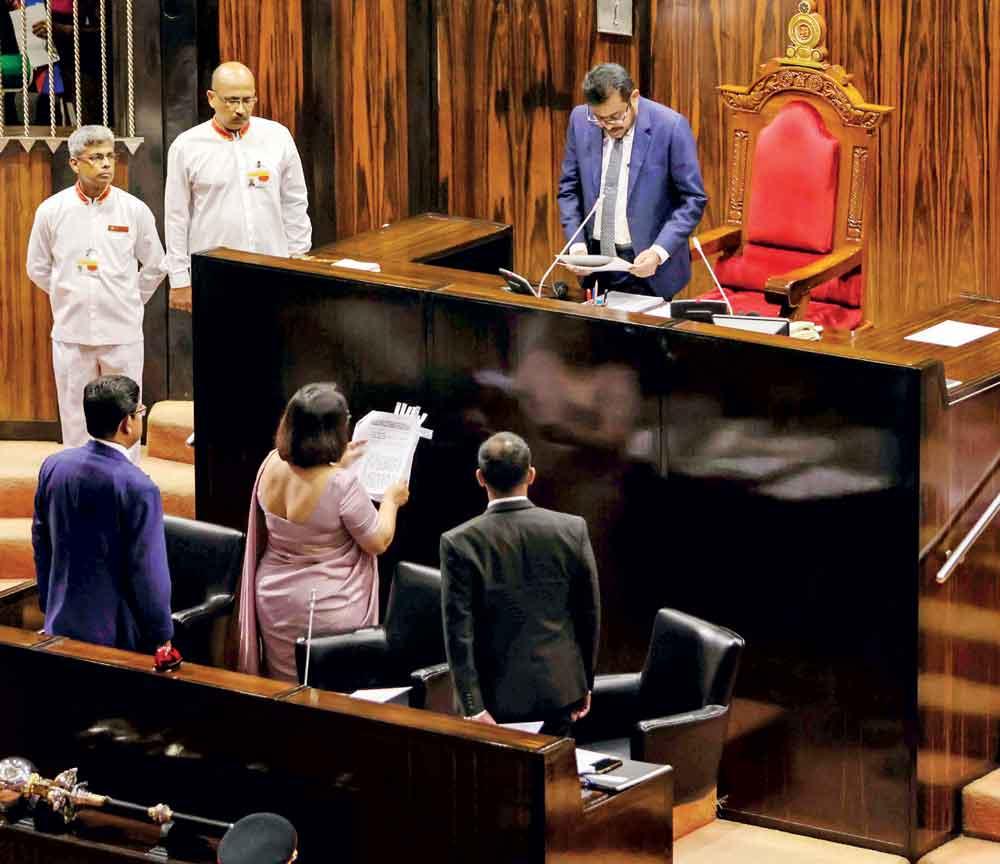Reply To:
Name - Reply Comment


Asoka Ranwala only stayed as Speaker of Parliament for 22 days before he had to resign over his disputed educational qualifications
| People today are flooded with information, it has pros and cons, particularly in a democratic society |
With the advent of media and social media, people today are flooded with information, misinformation and disinformation, and it entails both upsides and downsides, particularly in a democratic society. Instant, regular flow of information has revolutionised social order with people becoming better armed with information to make informed decisions and rationalise their choices. The flow of information helps build public opinion on a particular thing in quick time, and this keeps governments constantly under check in the democratic world.
The rapid circulation of information helped galvanise public opinion in 2021 and 2022 in Sri Lanka during the economic crisis, and it eventually facilitated a forceful gathering of people to depose then President Gotabaya Rajapaksa government. The economic hardships hit almost every household in the country at that time and public protest rallies that began as a trickle snowballed into a massive show of power, as a result, he fled the country when protestors laid siege to his office. Flow of information in the digital era facilitated the swift mobilisation of people. Sri Lanka was not unique in this case. It happened in many other parts of the world with Bangladesh being the latest example. Spread of information is a sharp tool in making, reshaping and conditioning public minds.
A recent example
In Sri Lanka, this sharpness was proven once again when former Speaker, Asoka Sapumal Ranwala, stepped down from office in the wake of mounting public criticism both on mainstream and social media against his disputed educational qualifications. Citing the inability to prove his academic qualifications with documents at this hour, he tendered his resignation to President Anura Kumara Dissanayake who accepted it forthwith. The JVP, the political party which he represents, communicated his resignation to the press. It leaves scope to believe that the party wanted him to step down, as otherwise it will be further humiliated in the public eye. Debate on merits and demerits is one thing. What is key here is that the government, the most powerful ever in Post-Independence Sri Lanka, had to bow down to public pressure built by the media and inflamed by the opposition. The government is formidable, commanding 71 percent of parliamentary seats. It is still aglow with its massive victory at the November 14th general election. The opposition is all too weak and reeling under the impact of the defeat. Yet, it inflamed a public outcry with the facilitation of media and social media, forcing the Speaker, the third highest ranker in terms of protocols, out of office.
His resignation from office underpins the fact that the rise of media and social media has undoubtedly held governments accountable. In addition, it has transformed the dynamics of democratic societies, presenting both opportunities and challenges. In this particular instance, in regards to Mr. Ranwala, has helped amplify voices against the governing party which eventually swallowed the bitter pill and asked its member to vacate office rather than being an embarrassment or humiliating it further.
It teaches a valuable lesson in democratic governance once again with avid examples. Governments are now under constant observation in the world. Sri Lanka is no exception. Any protest against it can be amplified in split seconds. In governing a country, political parties and bureaucrats should be extra cautious in their actions and decisions. Missteps by them can be politicised quicker than they think. Narratives keep changing across online platforms, leaving little room for delayed responses. It results in swift mobilisation of public dissent that can even trigger a backlash.
Keeping Governments accountable
It is helpful in holding governments to account anywhere in the world. Governments are forced to be proactive in addressing or mitigating public concerns. Governments were primarily held accountable through periodic elections in the past. Today, the media and social media ensure that accountability is an ongoing process. Governments are toppled by people without waiting for elections.
Nevertheless, the very same tools that empower citizenry can be weaponised to spread false narratives or manipulate perceptions with little time for countering them.
Today, governments face unwarranted public backlash based on unverified claims, leading to rushed policy decisions or a loss of focus on critical issues. Elements with vested interests can exploit platforms to spread propaganda, destabilize governments, or influence elections.
Politicians are prompted today to tell the truth. Ruling party MP Nilanthi Kottahachchi is paying for what she remarked during the election campaign, for instance. Wherever she steps out, she has become a laughing stock with the media questioning her remarks.
Misinformation about government policies or officials can damage public trust, even when unfounded.
In a multi-party democracy, the opposition will fuel its narrative, well-founded or unfounded, against the ruling party. False narratives often outpace official clarifications. It will result in challenges for governing parties in the world.
Any protest against it can be amplified in split seconds. In governing a country, political parties and bureaucrats should be extra cautious in their actions and decisions. Missteps by them can be politicised quicker than they think
Governments of today’s world put a focus on Modern fact checking mechanisms and regulatory mechanisms in this era of abundant information, misinformation and disinformation.
For people, media literacy and digital literacy are more important than ever. A deep study of issues is absolutely important. On social media platforms today, even complex matters are oversimplified and misinterpreted at times.
In modern democracies, ruling parties are required to be more and more accountable and transparent while taking proactive measures to counter misinformation and disinformation. Citizenry with sound media, digital literacy is fundamental for democratic governance to thrive.